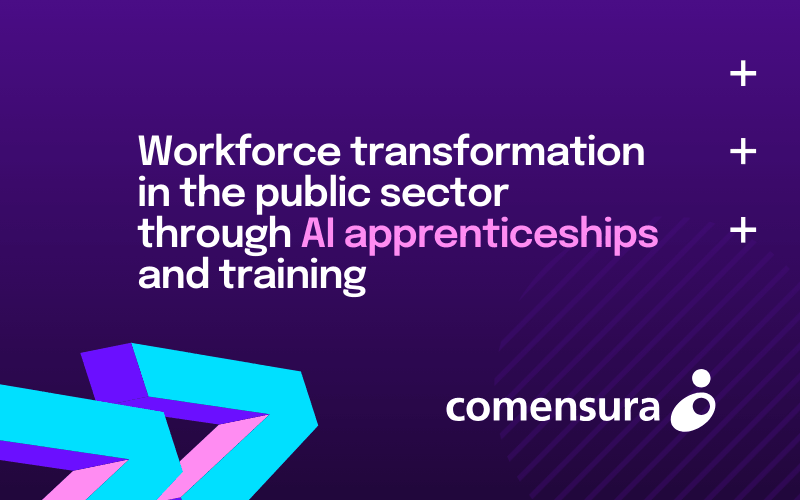

Author
Director of Skills Growth
2025-08-22
4 minutes
Workforce transformation in the public sector through AI apprenticeships and training
Artificial Intelligence (AI) has rapidly evolved from an ambitious vision of the future into an indispensable part of our professional lives.
In the public sector, AI offers opportunities to deliver better services, improve efficiency, and support communities in new ways. Since the major breakthrough in AI technologies in 2022, government agencies have been reimagining their work processes, reevaluating operations, and redefining employee roles to leverage the full potential of AI.
As public sector organisations face increasing demands and resource constraints, harnessing AI has the power to fundamentally transform how services are delivered, policies are implemented, and communities are served.
AI Adoption in the public sector
By the end of 2024, 75% of workplaces—including a growing number of government offices and agencies—had adopted AI tools into their daily operations. Nearly half of these organisations made the transition in less than six months, reflecting a remarkable shift in how public services are managed and improved.
This swift transformation is not only changing processes and productivity but also represents a strategic reorientation toward data-driven decision making and enhanced responsiveness. For public sector leaders, the challenge is not simply whether to adopt AI, but how to do so responsibly, equitably, and effectively to meet the unique needs of citizens.
AI integration is producing dramatic results for government agencies. Data from Microsoft and LinkedIn reveals that three-quarters (75%) of all employees—regardless of sector—are now using AI tools in some capacity.
Addressing the skills gap is essential for the public sector to fully benefit from AI. A recent study from Raconteur in partnership with Guidant Global found that 54% of employers cited technical skills gaps as a major challenge, with AI skills (53%) ranking just below cybersecurity (54%) as the most critical area.
For government agencies, the rapid pace of technological change means staff must be equipped to leverage AI responsibly and effectively, or the risk is that public sector organisations will lag behind.
AI Apprenticeships: Building public sector technology capabilities
AI apprenticeships offer public sector organisations a structured pathway to develop hands-on experience with AI, transforming both the workforce and institutional capacities.
Artificial Intelligence apprenticeship programmes are designed to nurture employees who wish to expand their knowledge, provide ongoing training that evolves with technology, and demonstrate real-world applications relevant to public sector challenges. By empowering agencies to foster in-house AI expertise, AI apprenticeships support employee growth while strengthening the ability to respond to community needs.
Benefits include:
-
Identifying and developing talent with foundational AI knowledge
-
Providing adaptable training programmes tailored to the changing landscape of public service
-
Demonstrating how AI can be applied directly to government operations and citizen services
-
Creating a pipeline of skilled professionals aligned with organisational mission and values
Investing in AI apprenticeships ensures that public sector agencies develop the skills needed to adapt as AI reshapes the business and service environment.
Recruit, Train, Deploy: Bringing AI apprenticeships to the public sector
To meet the rising demand for AI skills in the public sector, a robust AI apprenticeship programme based on the Recruit, Train, Deploy model can be transformative.
Recruit
Talent communities—whether drawn from within government or from new external candidates—are tapped to find motivated individuals for AI roles. This includes both early-career professionals interested in public service and experienced employees aiming to upskill for technology-driven work.
Train
In partnership with leading training providers, agencies deliver accelerated, customisable programmes covering:
-
Core data analysis and Python fundamentals—the building blocks of AI systems used in government analytics, policy modelling, and citizen engagement.
-
Advanced AI and machine learning tools, enabling staff to design and implement innovative solutions tailored to public sector needs.
-
Tailored learning pathways that address the specific challenges and timelines of individual agencies or departments.
Apprenticeship levels span 4 to 6 and include bootcamps and upskilling initiatives lasting 8–16 weeks, so both new and existing staff receive the training they need to thrive in an AI-enhanced environment.
Deploy
After completing training, apprentices are assigned to positions where they can apply their new skills. This process helps agencies close the skills gap, address shortages, and create a structured route for advancement and retention within public service.
Proven results: Transformational impact in the public sector
The impact of structured AI apprenticeship programmes is demonstrated by measurable outcomes:
-
100% apprenticeship completion rate
-
Over 60% of learners achieve distinction or merit grades—compared to just 33% industry average
-
More than 5,000 AI and data specialists trained
-
12–15 month apprenticeships with rapid return on investment for government agencies
-
Zero-cost upskilling possible through government apprenticeship levies and funding mechanisms
Comprehensive support is provided throughout the apprenticeship journey, from candidate selection to course completion. The goal: to ensure both learners and public sector organisations succeed in the short and long term, ready to meet tomorrow’s challenges.
Building public sector AI capabilities
AI is not simply a distant possibility for government—it is a reality shaping public sector workplaces today. Agencies prioritising AI skills development will be the leaders in delivering modern, effective, and citizen-focused services. Structured apprenticeship and training programmes offer a scalable, cost-efficient way to cultivate the talent the public sector needs to excel in the age of AI.
Whether you are a public sector leader aiming to close AI skills gaps, or a professional looking to secure your future in government, the Recruit, Train, Deploy model provides a launchpad for the next chapter of your career and your agency’s success. Investing in AI apprenticeships means investing in people, in innovation, and in the communities government serves.
Next steps
To learn more about how your agency can take advantage of AI apprenticeship programmes and transform your workforce for the future, contact: chris.blackburn@impellam.com
Insights to drive workforce performance
Workforce insights in your inbox
Sign up for our newsletter with the latest workforce management news, insights, analysis and more.
United Kingdom
First Floor, Mulberry House
Parkland Square
750 Capability Green
Luton, LU1 3LU
Australia
Suite 1403
Level 14, 309 Kent Street
Sydney
NSW 2000







